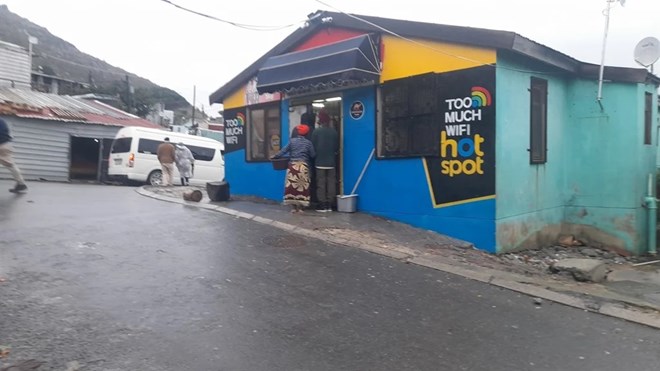
Tuesday August 20, 2024

KwaNdosi spaza shop, one of the three locations in Imizamo Yethu where Somali shopkeepers were targeted in a deadly coordinated shooting on August 16, 2024. The attack left three shopkeepers dead and six others seriously injured. Photo by Misheck Makora.
CAPE TOWN, South Africa (HOL) — The Somali community is mourning the loss of three shopkeepers who were killed on Friday in a coordinated attack in an informal settlement near Cape Town, South Africa. Six other Somali nationals were seriously injured in the shooting, which took place around 7:30 PM on Molokwane Street, a road within the Imizamo Yethu settlement.
According to local police, the attack targeted three separate spaza shops run by Somali shopkeepers. Unidentified gunmen opened fire on the shops simultaneously, leading to the tragic deaths of three men and critically injuring six others, who were rushed to a nearby hospital for emergency treatment.
A woman who witnessed the shooting at the KwaNdosi spaza shop said she was inside buying bread and milk when the violence erupted. As she was selecting her items, she heard gunshots. When she looked toward the door, she saw the Somali man who had been guarding the entrance lying on the ground, bleeding.
"I dropped everything and ran to the door, jumping over the injured man on the ground, and fled. As I was outside, I heard more gunshots inside the shop, so I think they were shooting the second man who was behind the counter."
Western Cape police spokesperson Colonel André Traut confirmed the incident, noting that detectives are investigating the motive behind these brutal killings. "The reason for these murders and attempted murders is under investigation," Traut stated.
The community in Imizamo Yethu remains tense following the attack. Hout Bay Community Policing Forum (CPF) chairperson Loyiso Skoti expressed the community's shock and said efforts are underway to address the violence through awareness campaigns and community meetings. Molokwane Street has been designated a "red zone," restricting access due to safety concerns.
There are growing suspicions that the attack may be linked to extortion activities targeting Somali shopkeepers. Community leaders have noted that the timing of the attack, occurring just after protection fees were typically collected, raises concerns that these murders were a direct consequence of the ongoing extortion racket in the area. A local leader, speaking anonymously due to fear of retaliation, stressed, "The timing of this attack, right after protection fees were supposed to be paid, is concerning," the leader said. "Our community is living in fear, and we need protection."
The Somali Community Board of South Africa (SCBSA) reports that Somali nationals, especially those who run small businesses like spaza shops, have long been victims of extortion and violence. One shopkeeper, who survived the attack, expressed his fears: "We don't know why this happened. It's frightening to think this could happen to any of us at any time."
The homicides are not isolated but part of wider xenophobic violence that has plagued South Africa, particularly targeting Somali shopkeepers. In 2008, a wave of xenophobic attacks swept through South Africa, leading to the deaths of dozens of foreign nationals. Over the years, Somali nationals operating small businesses in townships across the country have frequently been victims of violence, often driven by xenophobia and economic rivalry.
In May 2024, similar xenophobic violence erupted on the Cape Flats, resulting in the deaths of seven foreign nationals in just one month.
Police Oversight and Community Safety MEC Anroux Marais condemned the killings, calling on the public to assist the police in bringing the perpetrators to justice. Marais also stressed that xenophobic violence has "no place in the Western Cape" and expressed confidence in the Serious and Violent Crimes Unit's ability to resolve the case.
The SCBSA has criticized the South African police for failing to protect Somali nationals, arguing that the lack of a strong governmental response has allowed these attacks to persist.